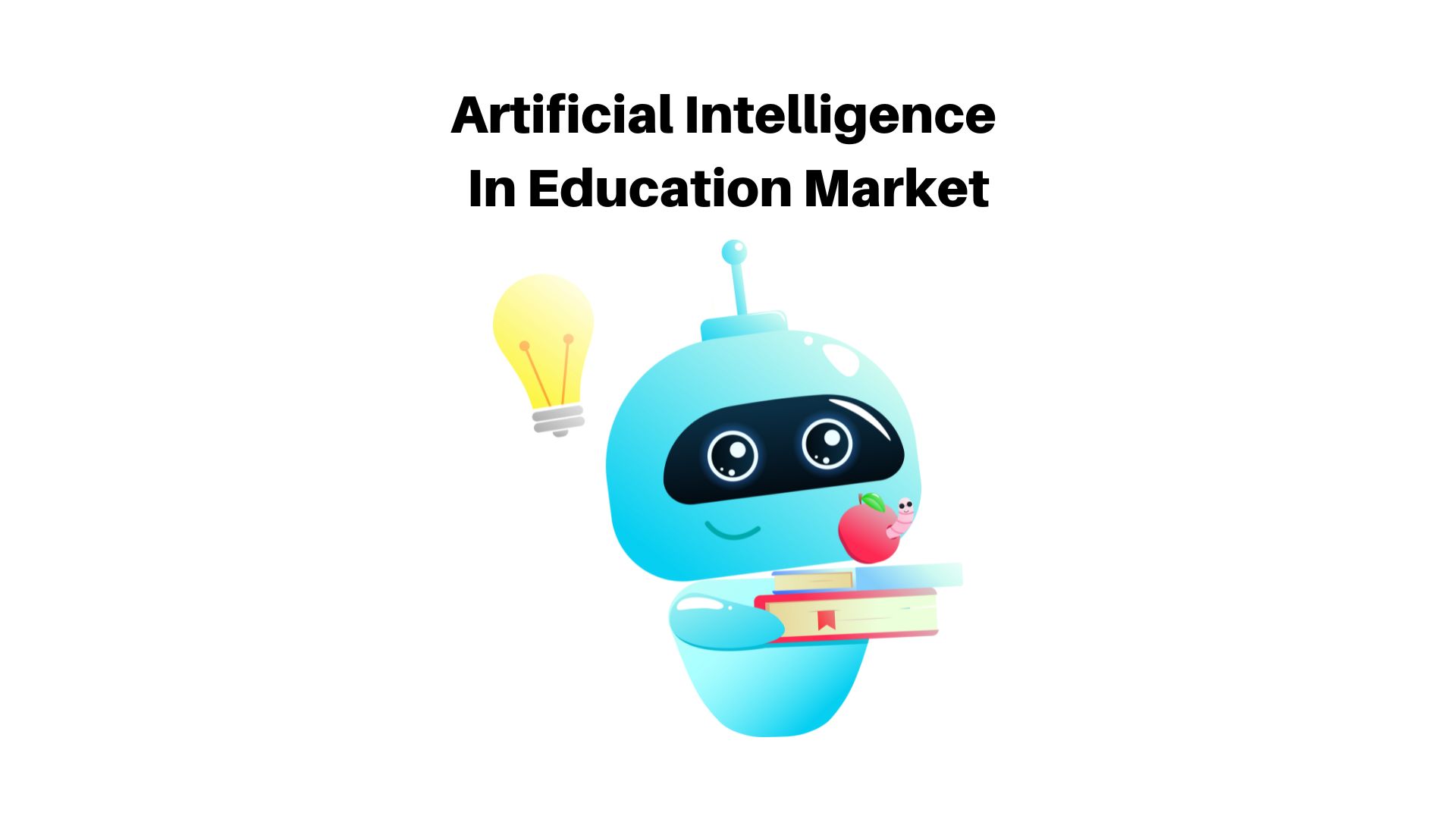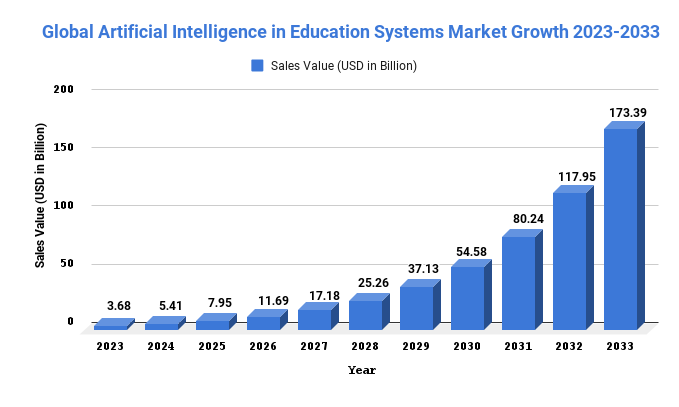Artificial Intelligence In Education Market size is expected to reach USD 173.39 Bn by 2033

Page Contents
Market Overview
Published Via 11Press: Artificial Intelligence In Education Systems is becoming more and more popular, with the market expected to expand significantly over the coming years. AI holds the potential to revolutionize how students learn and teachers instruct by offering personalized and adaptive learning experiences. Artificial Intelligence-powered educational solutions range from intelligent tutoring systems and learning management systems to virtual learning environments. These applications utilize algorithms and machine learning to customize learning experiences, provide real-time feedback, and increase student engagement.
The Artificial Intelligence In Education Market size is expected to reach USD 173.39 Bn by 2033, up from its current value of USD 3.68 Bn in 2023, growing at an annual compound growth rate (CAGR) of 47% from 2023-2033.
Artificial Intelligence is not just for K-12 schools; it has also found applications in higher education and corporate training. In these institutions, AI helps boost student retention rates, anticipate academic outcomes, and personalize learning experiences. Meanwhile, corporate training uses AI to improve employee performance and reduce training expenses.

Key Takeaways
- Artificial Intelligence technology enables personalized learning experiences, which are becoming increasingly important as students have diverse learning needs and preferences. The COVID-19 pandemic has hastened the adoption of e-learning solutions that rely heavily on AI technology for providing tailored content. With so many educational apps and platforms now available, there is now a large market for AI-driven adaptive learning systems and intelligent tutoring systems.
- Artificial Intelligence technology can be utilized for automated grading, feedback and evaluation of student performance, saving educators time while providing more precise assessments. Investment in AI technology for education is on the rise, with major companies and educational institutions investing in research and development to enhance teaching and learning processes.
- Natural language processing and machine learning technologies have enabled AI to comprehend human language, leading to the creation of more sophisticated educational tools and systems. However, using AI in education raises privacy and security risks – particularly related to student data collection and storage. Education stakeholders must address these concerns if they wish to build trust in AI-powered educational solutions.
Click Here To Access Sample Pages Of This Report: https://marketresearch.biz/report/artificial-intelligence-in-education-system-market/request-sample/
Regional Snapshot
Artificial intelligence (AI) in the education system market is a rapidly developing industry that is revolutionizing how students and educators learn. AI is being employed to offer personalized learning experiences, analyze student data to identify areas for improvement, and automate administrative tasks.
- North America: North America is expected to dominate AI in the education system market due to its high adoption of advanced technologies and the presence of major AI vendors. The US and Canada are predicted to lead this region's market.
- Europe: Europe is expected to experience significant growth in AI in the education system market due to government initiatives promoting its adoption and rising demand for personalized learning experiences. The UK, Germany, and France are projected as being the key markets within this region.
- Asia Pacific: Asia Pacific is expected to witness the highest growth in AI for educational systems due to increasing investments in educational technology and increased adoption of e-learning solutions. China and India are expected to be major driving forces behind this region's market development.
- Latin America: Latin America is expected to experience moderate growth in the AI education system market due to an increasing need for creative teaching methods and a desire to boost student outcomes. Brazil and Mexico are anticipated to be two major markets within this region.
- Middle East and Africa: The Middle East and Africa are projected to witness rapid growth in the AI education system market due to increased investments in educational technology and rising demand for online learning solutions. UAE and South Africa are two major markets within this region.
Inquire Here & Query for the report: https://marketresearch.biz/report/artificial-intelligence-in-education-system-market/#inquiry
Drivers
There are a number of key drivers driving the growth of artificial intelligence (AI) in the education system market. AI technology enables personalized learning experiences tailored to each student's individual needs and interests, leading to improved engagement and learning outcomes. AI algorithms can analyze student performance data in real time and adapt materials and instruction accordingly – leading to more efficient teaching methods. Furthermore, these AI tools automate administrative tasks like grading or record keeping, freeing teachers up to focus on more meaningful interactions with their students.
AI-powered educational tools offer students access to high-quality learning resources and opportunities, regardless of their location or socioeconomic status. Recent advances in AI and machine learning technology are enabling educational institutions to leverage large amounts of data in order to create more sophisticated and efficient learning experiences. Furthermore, these systems help reduce costs associated with traditional classroom-based education such as textbooks, facilities, and staff – making education more affordable for a wider range of students.
Restraints
- High Cost: The development and implementation of AI in education systems can be expensive, which may pose a barrier for some educational institutions that do not have the funds to invest in these technologies.
- Limited Data Accessibility: Artificial Intelligence in education requires large amounts of data to train algorithms and improve accuracy. Unfortunately, in certain fields, there may not be enough available for effective AI solutions to be created.
- Lack of Technical Skills: Implementing and maintaining AI systems necessitate specialized technical abilities which may not be readily available in all educational institutions.
- Privacy and Security Concerns: Artificial Intelligence systems in education may collect sensitive personal data, leading to privacy and security issues if not properly safeguarded.
- Resistance to Change: Some educators and administrators may be resistant to innovation and may not be willing to adopt new technologies, including AI in education.
- Bias and Fairness: Artificial Intelligence systems can exacerbate existing biases and inequalities within the education system if they are not designed and implemented with fairness and equity in mind.
- Ethical Concerns: There may be ethical implications when using AI in education, particularly with respect to student privacy, data ownership, and algorithmic decision-making.
Opportunities
The integration of Artificial Intelligence (AI) in education presents immense possibilities and advantages for both students and teachers alike. AI can be employed to design personalized learning experiences based on students' strengths, weaknesses, and learning styles. Students can learn at their own pace, improving performance. AI-powered assessment tools can analyze student responses in real-time and offer instant feedback, as well as adjust questions' difficulty levels accordingly. Teachers can utilize AI-based tutoring systems to understand students' progress and adjust their teaching strategies accordingly. AI-based tutoring systems offer personalized assistance, helping learners comprehend difficult concepts and enhance performance.
AI can be utilized to craft content tailored to each student's learning needs, providing them with a tailored experience. AI-powered analytics enable educators to anticipate student performance and identify areas needing extra assistance, allowing them to intervene early and provide timely aid. Chatbots powered by AI provide round-the-clock assistance for students, answering their queries on both academic and non-academic matters alike. AI virtual assistants help manage both academic and personal schedules by reminding them of deadlines and appointments.
Challenges
Artificial Intelligence (AI) in education is rapidly becoming a mainstream field, yet it still faces some significant obstacles that must be addressed. One major difficulty faced when integrating AI with existing systems can be integration – which may take an extensive amount of time if your current ones are outdated or incompatible with AI technologies. Furthermore, with large amounts of data collected and stored, privacy and security become major concerns; protecting sensitive information is essential for building trust when using AI for education purposes.
Artificial Intelligence systems can be biased if they are not designed and trained properly. Therefore, it is essential that any educational institutions utilize Artificial Intelligence systems that do not discriminate against any group of students based on factors like race, gender or socioeconomic status. The use of AI in education raises ethical concerns, such as the potential replacement for human teachers by AI systems or profiling students based on performance data. Artificial Intelligence systems require a significant amount of processing power and sophisticated algorithms, which may pose difficulties for some educational institutions. Furthermore, there may be technical restrictions with respect to the quality and consistency of data being used to train an AI system.
Market Segmentation
Segmentation by model:
- Learner model
- Pedagogical model
- Domain model
Segmentation by technology:
- Natural Language Processing
- Machine Learning
- Virtual Personal Assistant
- Querying Method
- Context-Aware
Key Players
- International Business Machines Corporation
- Cognizant Technology Solutions Corp.
- Nuance Communications, Inc.
- Quantum Adaptive Learning, LLC.
- ALEKS Corporation
- Blackboard Inc.
- DreamBox Learning, Inc.
- Jenzabar Inc.
- Microsoft Corp
- Pearson Education, Inc
- Knewton, Inc.
Report Scope
| Report Attribute | Details |
| Market size value in 2023 | USD 3.68 Bn |
| Revenue forecast by 2033 | USD 173.39 Bn |
| Growth Rate | CAGR Of 47% |
| Regions Covered | North America, Europe, Asia Pacific, Latin America, and Middle East & Africa, and the Rest of the World |
| Historical Years | 2017-2022 |
| Base Year | 2022 |
| Estimated Year | 2023 |
| Short-Term Projection Year | 2028 |
| Long-Term Projected Year | 2033 |
Recent Developments
Artificial Intelligence-powered chatbots and virtual assistants are becoming increasingly common in the education sector to offer personalized assistance, answer students' questions, and offer feedback on their performance. This technology is helping to increase student engagement and retention rates. Adaptive learning platforms use Artificial Intelligence algorithms to personalize each student's experience based on their strengths, weaknesses and preferred learning style. These platforms are becoming more and more commonplace in higher education institutions, as they help improve student outcomes and reduce dropout rates. Artificial Intelligence-powered gamification is being employed to boost motivation and engagement with learning processes. Gamification techniques like badges, points, and leaderboards have been integrated into learning platforms to make the experience more enjoyable and rewarding for students.
AI-powered content creation tools are being utilized to craft interactive and captivating learning materials. These systems utilize natural language processing and machine learning algorithms to craft materials tailored to individual learners' needs. Predictive analytics is being employed to identify at-risk students and offer tailored interventions in order for them to succeed. By analyzing student data, Artificial Intelligence algorithms can predict which students are likely to struggle and provide them with personalized support to help them overcome those difficulties.
Contact us
Contact Person: Mr. Lawrence John
Marketresearch.Biz (Powered By Prudour Pvt. Ltd.)
Tel: +1 (347) 796-4335
Send Email: [email protected]
The team behind market.us, marketresearch.biz, market.biz and more. Our purpose is to keep our customers ahead of the game with regard to the markets. They may fluctuate up or down, but we will help you to stay ahead of the curve in these market fluctuations. Our consistent growth and ability to deliver in-depth analyses and market insight has engaged genuine market players. They have faith in us to offer the data and information they require to make balanced and decisive marketing decisions.



